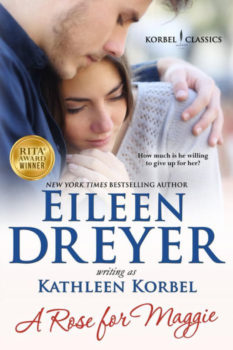A Rose For Maggie
How much is he willing to give up for her?
It would be too easy for Alison Henley to fall for children’s book author Joe Burgett. Joe feels the same way about Alison, but Alison has a baby named Maggie, and Maggie has special needs. Is Joe
ready to be her father?
“An all-time classic” RT Booklovers
A RITA Award Winner!!
Originally published August 1991 w/a Kathleen Korbel in Silhouette Intimate Moments #396 and May 1996 by Silhouette in mass market paperback.
1991 Alton, Illinois
Allison Henley wasn’t exactly sure what to expect. She’d driven to the address along the bluffs above the town of Alton on impulse. Allison was suddenly tired of trying to get the mysterious L. Wood Dowd to return her calls, and she was running out of time to arrange the publicity River Roads Publishing was requesting before his next book appeared.
Not that Dowd wanted the publicity. That was just the point. An invisible eccentric who hid behind an evocative fictitious name, the latest rage in children’s literature, author and illustrator of the Binkley Brothers series, Dowd consistently refused not only to promote himself or his work, but to be identified period.
Even the publisher, a small regional house that had exploded into notoriety with these surprise bestsellers of the nineties, didn’t exactly know who Dowd was. He lived in Alton, Illinois, where the publishing house was located, and corresponded via post-office box, answering machine and lawyer. And, until recently, the publisher had been happy with the arrangements because Dowd had been even more punctual than mysterious.
But, of course, that had all changed. Business being what it was, the new director of marketing wanted Dowd on the talk-show circuit. He wanted his cute, quaint picture on the book jacket along with his wildly imaginative creatures. He wanted him out there shaking hands with all those little tykes and their upscale parents who bought, read and cherished his family of monsters.
Much to Allison’s chagrin, she had signed on with River Roads just in time to fall prey to the job of locating the mysterious author.
“Publicity should be doing this,” she’d argued.
“Just how far do you think we’d get when we identified ourselves?’’ they’d countered.
If Allison didn’t need the job so much, this job that offered her not only income, but freedom and flexibility when she needed it the most, she would have told them to harass the old man themselves. Instead, she found herself pulling her car to a stop at the edge of a long gravel drive that wound up to a huge, three-storied brick Victorian perched high above the Mississippi River.
Shutting off the engine of the little compact that sported both briefcase and infant car seat, Allison took a moment to circle the wagons. Dowd wouldn’t be happy, she knew, especially when he realized to what lengths she’d gone to uncover his address. If she were the old man, she’d feel violated and furious to find the boss at the front door. Especially when that had been one of the few stipulations in a contract that provided Dowd with his creative outlet and River Road Publishing with its golden egg.
“If only you’d answered my calls this last two weeks,” Allison practiced instinctively, doing a quick check of her appearance in the rearview mirror and then raking quick fingers through close-cropped brown hair to push it back into order. The eyes that met her gaze were more troubled than she should admit, darker than she wanted. Changed irrevocably over the last few months from the bright sparkle she’d brought to her other jobs. “Ah, well,” she said to herself as well as her phantom target. “Stuff happens. You go with it or you sink.’’
And then she smiled, and that, too, bore too much testament to be open and bright. Shaking her head ruefully at herself, she reached for her briefcase that held the latest Binkley manuscript, The Binkley’s Birthday, and climbed out of the car.
For a minute, Allison didn’t want to move. The soft spring air hovered with scent along the bluff. Far below, the wide slash of water glittered in an afternoon sun. Birds chattered and trilled in the gnarled oaks and chestnuts that were beginning to send out buds. Flowers exploded along the drive, along the walks and around the porch. Tulips, crocuses, jonquils, the first blush of azaleas. Startling color against the new spring green, a cacophony of life nurtured by a man too nervous to be seen in public.
Allison smiled. What kind of man was Dowd? She wondered yet again as she strode along the driveway, her heels scrunching in the gravel. Ever since her boss, Brook Donalson, had first placed a Binkley Brothers book in her hand, Allison had constructed one picture after another. The befuddled innocent from which he’d taken his name. A white-haired Samuel Clemens-type, his wry observations on life sketched with sometimes amazing precision. Santa Claus, with a hearty laugh and a great, huge lap for the children he seemed to love so much. His voice was quiet and restrained over the phone, deep enough to carry a heavy man, but formal enough to evoke visions of bow ties and suspenders.
She had to admit she couldn’t wait to finally put face to name, and not just to win the pool that had sprung up in the office since the word had come down that Dowd must make his appearance. She wanted to know just who would hide so completely behind a pseudonym that he’d go to court to acquire it and then refuse his real name to his publisher.
- Wood Dowd was Joseph Burgett. His identity had been discovered only because he’d put his real name and address on his request for a post-office box, and Allison, through some fast talking that a private investigator would have raised an eye at, had found it.
Probably his lawyer’s great-uncle or something, since they shared the last name. An eccentric uncle who lived all alone in the big, red, opulent old Victorian house that went with every image of Dowd she kept in her head. Fussy, hearty, private. A Victorian man caught in a twentieth-century society, hiding behind his beveled glass and sketching his monsters by Tiffany lamp. Allison couldn’t help another smile as she stepped along the sidewalk that ringed the house.
She saw the truck first, an old battered white pickup piled with lumber and toolboxes. Pulled in back behind the back porch, it sat with its tailgate down. The sound of the band saw seemed as if it was coming from the detached garage beyond it. Fine. She’d come to meet a writer and come up with his handyman instead.
The sound stopped. Allison could hear the birds again, crowded into the trees that surrounded the yard and all querulous. She smelled wood shavings now, mixed with the heavy sweet perfume of hyacinth. She straightened a little, smoothed down the lines of her jersey dress, ignored the mud that had collected on her bone-colored high heels and approached the open garage door
“Excuse me—”
Which was just about as far as she got. She’d been expecting—well, she wasn’t sure what she’d been expecting. Someone middle-aged maybe, certainly with a potbelly and battered jeans that barely hung on below. Somebody with practical eyes and callused, dirty hands. Somebody normal.
The man who turned at the sound of her voice was definitely not normal. The eyes that appeared when he lifted his safety goggles weren’t practical, and the belly wasn’t pot at all. It was taut and glistening, sprinkled in wood shavings and hair. The jeans were precariously low, it seemed. But Allison was afraid that that was only because she hadn’t expected to want to look at them so much. They molded taut legs and a very firm backside.
And his face…
“Hi,” he said, greeting her with a smoky, sultry voice. “Can I help you?”
He was smiling a bit quizzically, his chocolate brown eyes just a shade shy. There were furrows in his lean cheeks and stubble on his chin. His hair, which she’d expected to be buzzed and gray, was thick, coarse, falling over his eyes in slashes of brown. There was a little gray there, but it was all at the temples where it belonged.
Allison dragged her own gaze back to his, trying her best to regain her composure. She smiled back, knowing exactly why she was reacting so strongly. At least thinking she knew why she was reacting so strongly.
It had, after all, been a long time. And, because of the decision she’d made—the decision made for her—it would be a lot longer. It would be forever.
“I’m…sorry.” Her voice stumbled a little, her smile growing a bit rueful as she struggled to control her suddenly out-of-control hormones. “I’m looking for Mr. Burgett.”
The man before her pulled the goggles off the rest of the way and lay them against a hip. Allison fought the urge to watch their progress. His arms rippled with movement. A workman’s arms. Lean, well-muscled, decadent.
And then, just as Allison was beginning to regain some of her composure, when she was certain she could complete her conversation with Burgett’s workman and get away with her lungs and brain intact, he smiled with devastating simplicity and tossed off the punch line of the year.
“What can I do for you?”
Allison shook her head. “Joseph Burgett.”
“I’m Joe Burgett.” His attention shifted fractionally. Took on a sharp glint. “I know you, don’t I? You’re—”
But Allison, still trying her very desperate best to get past that sweat-gleamed body and whiskey voice, dropped her advantage like a bad apple. “You’re L. Wood Dowd?”
* * *
Buttoning the last button, Joe tucked his shirt into his jeans. He ran his hands through his hair, but that wouldn’t make much difference. It was still wet, curling a little at his collar, that one hunk stubbornly dropping over his forehead.
No matter. He had to get back downstairs and face the problem perched on the single chair in his living room. He had to figure out how to contain the damage and protect himself.
He wasn’t that upset that River Roads had finally found him. It had only been a matter of time all along, after all. But even before Allison Henley had said a word—he’d interrupted her earnest plea with a demand for a shower first, forestalling any confrontation long enough to regroup— he’d had a feeling that his days of anonymity were in perilous supply.
If only they’d sent somebody else. Somebody male and brisk and bristling with media jargon. He could have turned him down without blinking. He could have thrown him out of the house and threatened the whole lot of them with jumping ship to another publisher.
Joe had no illusions about his work. He wasn’t Ernest Hemingway. He wasn’t even Charles Schultz. The work he did with his hands would probably last longer than his books. But he knew that for some reason, he’d become a marketable commodity, which gave him a certain amount of leverage. It had also brought that very pretty, rather serious young woman into his living room.
And ever since Joe had first talked to his new editor on the phone, he’d been aware of the fact that he had a real weakness where that pretty, serious young woman was concerned.
The old, faded runner absorbed his footsteps as he descended the stairs to find her standing at the front window peering out toward the river.
“Great view, isn’t it?” he asked.
She started, and the drapes fell closed again, blocking out the view, blocking out the sun.
Joe pulled the heavy red curtains open, suddenly impatient with the dusky light in the middle of the afternoon. “I have the Binkley Brothers to thank for that view,” he admitted as the heavy red curtains slid open by yanks and starts. “I’ve wanted to live in this house ever since I was a kid and came up here to scare myself every Halloween. It was our local haunted house. Empty and full of cobwebs and creaky boards. The perfect place for a carpenter to buy and renovate.”
She stepped back away from him as if he’d come too close. Still stiff, still surprised and hesitant. It made Joe want to reach out to her. To close the distance and soothe the furrow between those soft, green eyes.
“It’s a wonderful old place,” she admitted, her gaze drawn to the high ceilings and crown molding. There was still a lot of original cabbage-rose wallpaper in the front rooms, because Joe had decided to renovate the rooms he’d be using first: bedroom, bath, kitchen, workroom. The rest was waiting until he got to it.
“I’m working on the library now,” he admitted, his own gaze following hers and seeing not the shabby remnants of someone else’s lives, but the possibilities. The ghosts that still crept around in the shadows and the angular, rich beauty that the sun exposed. Real hardwood floors, great expanses of glass, sweeping staircases, a kitchen big enough to fit the family at Thanksgiving. “I’m building bookshelves. And, of course, a hidden bar.”
“I shouldn’t have come here,” she said abruptly, turning on him, her dress flowing around her knees with the movement. “I’m sorry.”
She was small. Petite, with hair that glinted like mahogany and skin as translucent as mother-of-pearl. There was a delightful roundness to her figure, a female fertility symbol, and a compelling depth to her large eyes and oval, fine-boned face. There was also a hint of sadness, of weight on those soft shoulders.
“What for?” Joe smiled instinctively with a shrug. “You were probably only doing your job.”
Her quick grin made him think he’d surprised it out of her. “The pool money’s going to have to go to charity,” she said wryly.
“Pool money?”
Her grin caught and grew a little. “The office pool. The odds were heavily in favor of your looking like Captain Kangaroo and having half a dozen cats for pets.”
His laughter echoed through the house. “Exactly why a pseudonym comes in so handy.”
She shook her head, still not satisfied. “Your voice,” she objected. “It’s different than I’m used to.”
Joe was completely unrepentant. “It’s… nice to talk to you, Miss Henley,” he mimicked easily, his entire posture folding instinctively into position, hands crossed, head ducked into submission.
Allison chuckled. “That’s the L. Wood Dowd I know and love.”
Joe brightened up. “Not really,” he admitted. “Mr. Wilson Maloney. My eighth-grade social-studies teacher.”
She scowled at him. “Do me a favor and never take on a female pseudonym. I wouldn’t want to see myself dissected quite that surgically.”
“Oh, don’t worry,” he said. “I still have plenty of teachers to go through. Now then, if you’re here on business, I’d suggest we go into the kitchen. It’s the only room on this floor with more than one chair. And I’d much rather not try and duel with you from the floor.”
“I brought your line editing with me,” she offered, lifting the briefcase and following him through the hallway to the kitchen. “I thought we could go over it.”
Joe turned his head. ‘Something wrong?”
“No. They just need to get in right away, and I hadn’t been able to get in touch with you.”
He nodded absently. “I’ve been out of town on a job and just got back. I figured I had a good couple of months on those, yet.”
“Well, you did. But the publication’s been bumped up a little. River Roads is celebrating its anniversary in publishing, you know, and the Binkley Brothers are going to represent the company.”
“Interesting image,” he obliged, flipping on the lights in the kitchen. “Have a seat and we can get to work. And then you can tell me why you really came out.”
She stopped dead in her tracks, her face giving her away.
Joe couldn’t help a grin. “Have a beer,” he offered, turning to the refrigerator.
She barely moved. “I don’t drink, thanks.”
He turned back to her. “Soda? Tea? Milk?”
She just shook her head. “No. Thank you.”
He suspected her stomach wasn’t feeling very good right now. Deviousness did that to some people. Pulling open the door, he grabbed a beer and headed for the battered old Formica table he’d liberated from his parents’ house.
“Manuscript.” He nudged her on as he pulled out a chair for her.
“You’re right,” she acknowledged, still standing stock still with discomfort. “They do want something more.”
“And if I say no?”
She shrugged. “I haven’t gotten that far yet.”
Joe nodded and let go of the chair. “Then let’s start at the beginning.” He held out his free hand to her. “Hi, my name’s Joe Burgett. I write children’s books as L. Wood Dowd. And you?”
She shook Joe’s hand. “Your editor,” she said, finally giving in and smiling back. “It’s nice to finally meet you.”
They both settled into their chairs as if at a business meeting. Allison brought the briefcase up and opened it.
Joe paid little attention. “Tell me something about yourself,” he commanded, popping the tab on his can.
She paused, tilted her head a little. “I thought that was supposed to be my question.”
Joe waved off the objection. “I’ve been working with you on this book for two months, and I don’t know anything about you. The man you replaced kept me informed on everything from his home life to the progress of his car loan.”
She grinned. “It was his way to try and pry something out of you.”
Joe grinned back and knocked off a little of the beer. “I know. The quality of phone reception is phenomenal these days. I could even hear his teeth gnashing.”
Allison dipped her head a bit. “I guess I wasn’t quite as patient.”
“I don’t think I mind,” he admitted, surprised by his own sentiment, his natural trust of this woman he’d only talked to enough to properly decline verbs and redraw monsters. “Have you had lunch yet?”
Her head came up at that. Joe saw the sudden defense in those eyes. “Yes,” she lied badly. “I have.”
Joe nodded as if to himself. “What about dinner?” he countered. “Have you had that?”
He could tell she was fighting a smile. “I guess I’m funny about that kind of thing. I don’t like to eat dinner before two in the afternoon.”
“Well, then, that’ll just give us enough time to go over the manuscript and get that out of the way before I take you out.”
“No,” she said, certainly, simply. Finally. “Thank you, but I can’t.”
“You’re married?”
“No.”
“I’m married?”
“It wouldn’t matter.”
“I’m not.” He waited for a reaction, any reaction. He saw it in the faint pink on her cheeks. When she looked back up at him, he smiled. “Just in case River Roads wanted to know.”
“Are you ready to tell them?”
“You’re not going to distract me.”
Her smile was pretty and indescribably sad. “Yes, I am,” she told him. “I’m your editor, nothing more. I’ll be happy to work with you on Binkley s’ Birthday, and Showdown in the Binkley Saloon, and all the rest of the Binkley books. I’ll be your voice at the publishing house, and clear up your questions. But I don’t consider it a good policy to go out with my authors.”
“I wasn’t asking for a date.”
She didn’t quite answer.
“A business dinner. Everybody does it. At least, that’s what I’ve been told. Carpenters don’t get to go to business dinners that often. The most we can usually hope for is a visit to the drive-through window at Burger Doodle. But now that I’m a nationally famous author—I am, aren’t I?”
There was just a hint of humor struggling at the corners of her eyes. “You are.”
“Then I should be able to have business dinners. Or lunches or breakfasts. I just choose dinner.”
“In that case,” she offered, leaning in a little bit so that the soft mauve jersey knit pulled across her breasts, “I have the perfect offer for you.”
Joe leaned forward himself so that they were almost eye to eye. “You do,” he countered, anticipating her.
She nodded, her hair whispering with movement. “All the free meals you want. In any city you want. All on River Roads.”
“But I don’t want to go out with River Roads. I want to go out with you.”
“I told you,” she objected instantly. “I don’t go out with authors.”
“For business,” he amended just as quickly. “To discuss my newest idea.”
She didn’t even hesitate. “No. Thank you. Now, would you like to hear River Roads’ idea?”
Joe finally sat back. “Only if you’ll tell me why I’m so repugnant that you won’t even break bread with me. Would you go out with me if I looked like Captain Kangaroo and had six cats?”
Her eyes crinkled again, the laughter caught there behind them. “L.” She’d always called him L. on the phone. It had been their little joke about his pseudonym. Joe knew that her choice of salutation was intentional. Distancing. Final. “I don’t mean to sound rude. It’s not just you, believe me. I simply can’t continue working with you if we have less than a professional relationship. If you’d rather, I can see if someone else can edit you in the future. Anything you’d like. Except dinner.”
Joe took a second to assess her determination. She was awash in it. “And nothing I say or do can change your mind?”
She shook her head. “Nothing.’’
“Even accepting River Roads’ request that I come out in public only on the condition that you go with me?”
He wasn’t being fair. He hadn’t realized it until he saw her reaction. Every ramification of his statement flickered in those sweet green eyes in the time it took him to lift a hand.
“Never mind,” he said, taking hold of his beer again and quenching a surprise fire in his chest with it. “I may be many things. Hell, I am many things. I’m not a blackmailer.”
“Do you want a new editor?” she asked sincerely, no hint of rancor anywhere in her. Even so, Joe was tormented by the feeling that she was afraid of his answer. For more reasons than having a prestigious author on her resume.
“No,” he answered without hesitation. “I do not want another editor. I want you.”
She started, a wild thing catching the scent of a hunter.
“For an editor,” he amended, then held out his hand again. “Friends?”
It actually took her a moment to consider. Joe could feel the ambivalence shimmer from her like humidity in a summer sky. He could almost hear the argument raging in her head.
In the end, she gave in. Reaching out a hand, she met his gaze with certainty and nodded. “Friends.”
Joe held on just a little too long. Just long enough to ingrain the feel of her soft palm against his, the small, strong fingers caught and quieted within his. And then he let go and cooled that hand with his can of beer.
“Now then,” he said, reaching for the manuscript. “What have the Binkley brothers done now?”








